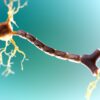Experts at the University of California, San Francisco have published in Alzheimer’s & Dementia demonstrating how physical exercise may improve synaptic integrity in the aging brain of older adults.
For the study, UC San Francisco researchers examined the relationship between exercise and synaptic integrity markers in older adults.
404 participants from the Rush Memory and Aging Project took part in the study.
“Brain tissue was analyzed for presynaptic proteins (synaptophysin, synaptotagmin-1, vesicle-associated membrane proteins, syntaxin, complexin-I, and complexin-II), and neuropathology,” according to the findings.
“Models examined relationships between late-life physical activity (PA) (averaged across visits), and timing-specific PA (time to autopsy) with synaptic proteins.”
Connections between neurons are enhanced upon the onset of physical activity by older adults, promoting healthier cognitive health and reducing the risk of neurodegeneration, the study found.
“Relationships between PA and presynaptic proteins were comparable across brain regions sampled,” researchers determined.
“PA associates with synaptic integrity in a regionally global, but time-linked nature in older adults.”


